Perak is the second largest of the 13 states in Malaysia. You may know it for Ipoh, the state capital, home to their legendary Hor Fun (silky soup noodles) and chicken rice. What you may not know are the tourist gems found in Perak that you should visit the next time you are there.
1. Kuala Kangsar heritage trail
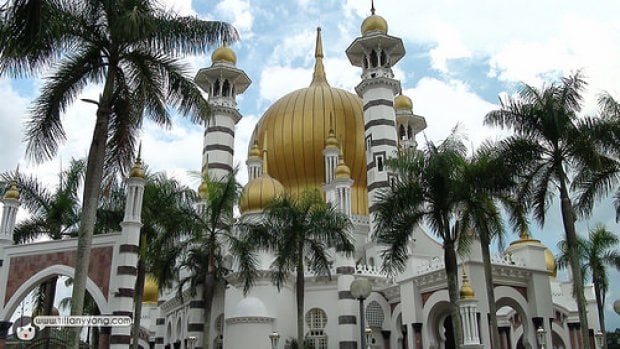
Kuala Kangsar is the royal town of Perak, Malaysia. Just 48 km north of Ipoh, there are several buildings that may catch your attention. The first one is the Masjid Ubudiah, Perak’s royal mosque. An impressive structure topped with a constellation of bright golden domes, Masjid Ubudiah ranks high as one of Malaysia’s most beautiful mosques.
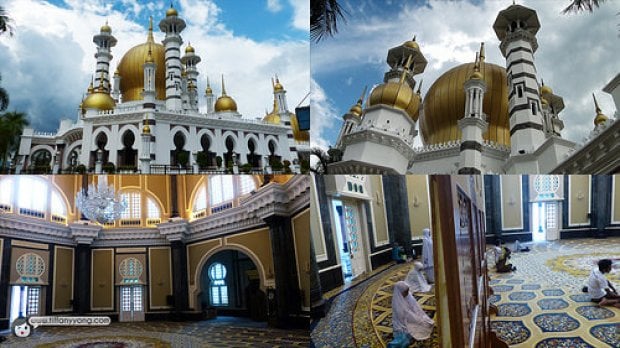
The mosque was designed by Arthur Benison Hubback, an architect notable for his design of the Ipoh railway station and the Kuala Lumpur railway station. Sultan Idris Murshidul’adzam Shah, the 28th Sultan of Perak used RM 200,000 (approx. SGD 79,000) to build this mosque as thanksgiving for recovery from an illness that had plagued him earlier. The mosque was completed late 1917.
Inside, the crystal chandelier and the exquisite details on the ceiling, walls, doors and carpet caught my attention immediately. If you want to take a look at the infrastructure from the inside, just make sure that you are dressed appropriately before entering. The mosque provides a brown cloak for interested parties to put on before entering. As you can see, there is a divider between the men and women who are supposed to enter separately for prayers. For detailed information on mosque etiquette, click here.
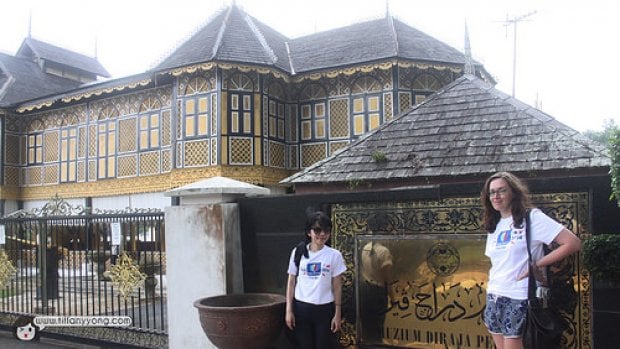
Once an old palace, Istana Kenangan is now known as the Royal Museum of Perak. Built in 1926, Sultan Iskandar Shah stayed there between 1931 and 1933 while waiting for the completion of Istana Iskandariah. Thereafter, the Istana Kenangan was used to host royal receptions and accommodate the palace guests.
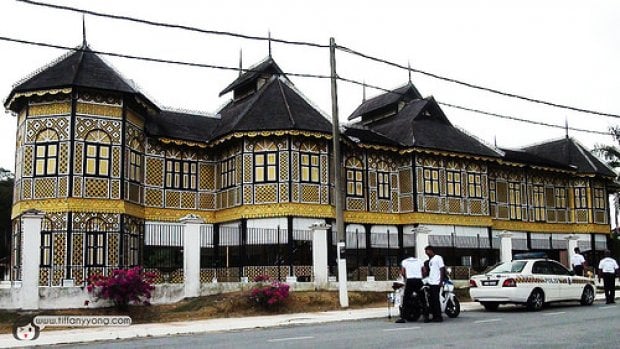
The shape of the structure when viewed from above resembles a sword in its scabbard. It is two-storey high, with the top floor consisting of the bedchamber, family bedrooms and a dining hall. Fine wooden carvings and woven wall-mats enhance the beauty and uniqueness of this wooden building.
Masjid Ubudiah Opening Hours: 10.00am – 5.00pm
Entrance Fee: Free
Address: Bukit Chandan, 33000 Kuala Kangsar, Perak, Malaysia
Tel: +605-7761144
Entrance Fee: Free
Address: Bukit Chandan, 33000 Kuala Kangsar, Perak, Malaysia
Tel: +605-7761144
Istana Kenangan Opening Hours: 9.30am-5pm Daily, Closed on Thursday 12.15pm-2.45pm, Fridays and Public Holidays
Entrance Fee: Free
Address: Istana Lama Bukit Chandan, Perak, 33000 Kuala Kangsar, Malaysia
Tel: +605-7765500
Photo-worthy Spot: ** | Heritage/Historical Value: *** | Visit if You are Free
Entrance Fee: Free
Address: Istana Lama Bukit Chandan, Perak, 33000 Kuala Kangsar, Malaysia
Tel: +605-7765500
Photo-worthy Spot: ** | Heritage/Historical Value: *** | Visit if You are Free
2. Ipoh Railway Station
The Ipoh Railway Station, also known as the Taj Mahal of Ipoh, was completed in 1935 to replace the original railway platform shed. The white structure, in a Neo-Moorish style, is said to be the second most beautiful railway station in Malaysia after its sister, the Kuala Lumpur Railway Station.
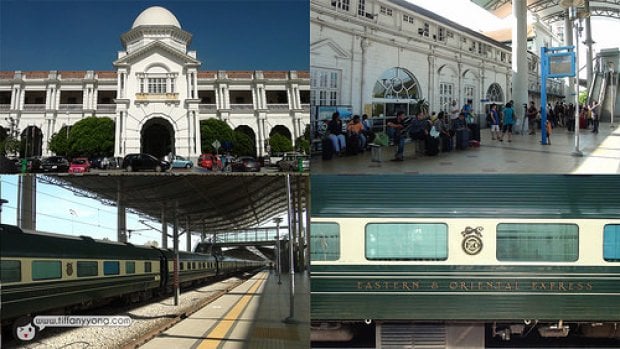
Located on Jalan Panglima Bukit Gantang Wahab, the station was initially meant to be a hospital before being turned into a station. Now, it houses the Majestic Hotel and was even used as a shooting location for the 1999 film “Anna and the King”, starring Jodie Foster and Chow Yun-Fatt.
Entrance Fee: FREE. Address: Ipoh Railway Station Jalan Panglima Bukit Gantang Wahab 30000 Ipoh, Perak, Malaysia Tel: +605 2540481 Photo-worthy Spot: *** | Heritage/Historical Value: *** | Visit if You are Free
3. Tanjung Tualang Tin Dredge
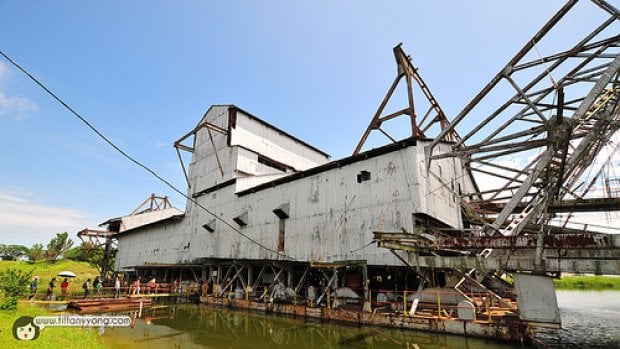
For those who know Malay, Perak means Silver (Tin is silver in colour). The place was named after the many tin mines present in the area.
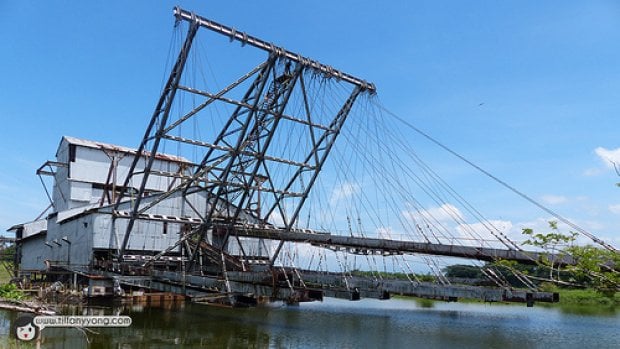
Perak was known historically for its tin-mining activities, and when the price of the metal dropped, the state’s economy was affected quite significantly. Tanjung Tualang Tin Dredge is the last dredge preserved by the local community and government. now used for educational and tourism purposes.
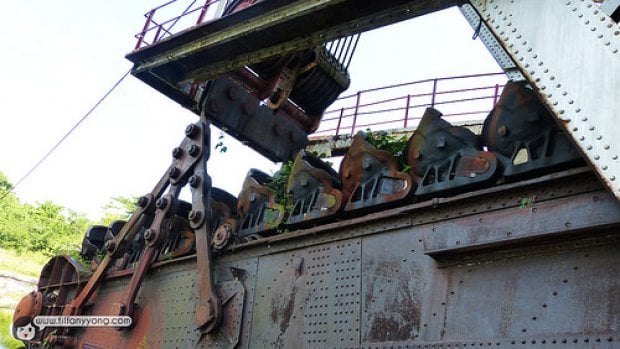
A tin dredge is like a floating factory in a mining pool. Tin dredges work by scooping up bucket loads of tin-bearing soil at the front end, then passing the soil through an oscillating drum and a system of jigs and screens to extract the tin. The waste materials are brought out at the rear end through a number of chutes.
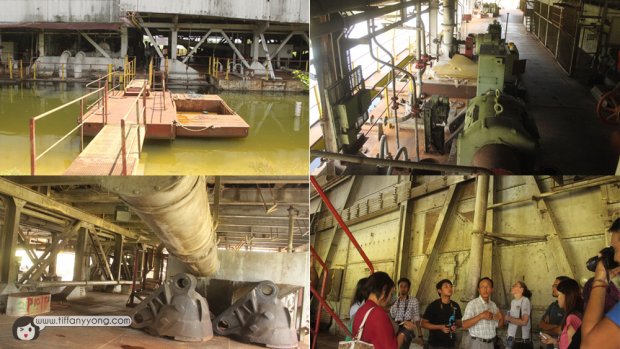
We followed the tour guide on a quick tour around the upper levels of the tin dredge “iron ship”, where I got to see the humongous buckets used to extract the soil. There were times when I wondered if the steps were able to hold our weight. However, the nice view of the nearby mining pools from the roof made the somewhat-risky trip up the dredge worth it. Many of these mining pools have been filled with water and converted to prawn farms, fishing ponds, wetlands and water features for housing developments.
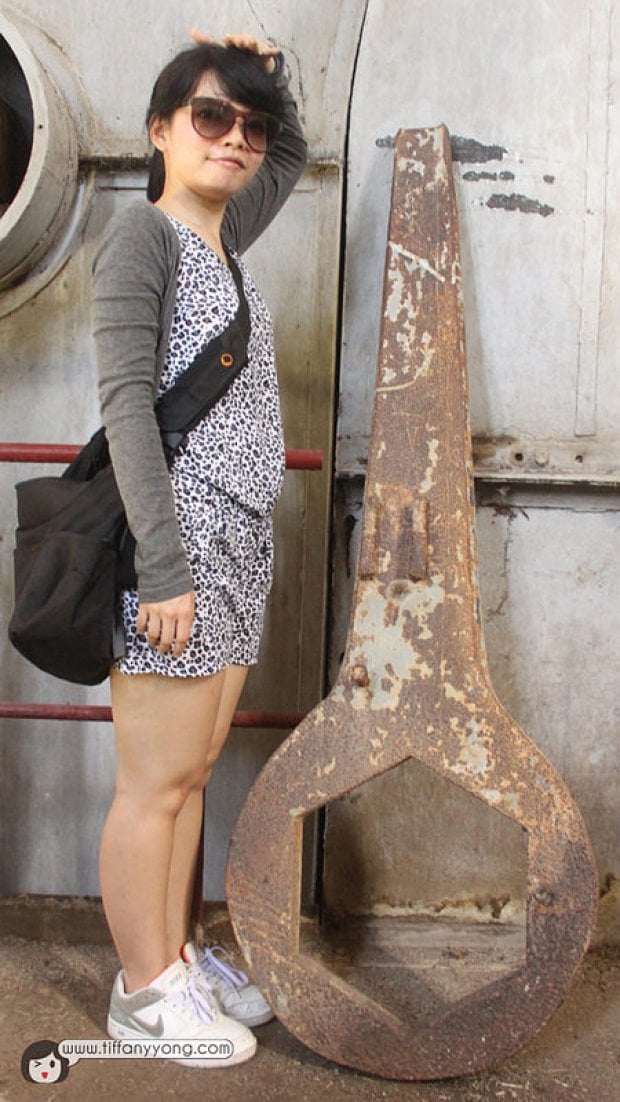
See, I even found the largest bolt wrench at one of the corner! It reminded me of a beer opener… for giants. Guess how many people will be needed to operate this life-size equipment? I will leave it to the tour guide to tell you if you ever visit this place!
Opening Hours: Daily 8.30am to 6.00pm
Entrance Fee: RM6 for adults, RM3 for kids (Packages available)
Address: Tanjung Tualang Tin Dredge Ship, Warisan Kapal Korek (Tin Dredge Heritage), 9th Km, Jalan Tanjung Tualang, 31000, Batu Gajah, Perak.
Tel: +605-3702253
Photo-worthy Spot: *** | Heritage/Historical Value: **** | Recommended!
Entrance Fee: RM6 for adults, RM3 for kids (Packages available)
Address: Tanjung Tualang Tin Dredge Ship, Warisan Kapal Korek (Tin Dredge Heritage), 9th Km, Jalan Tanjung Tualang, 31000, Batu Gajah, Perak.
Tel: +605-3702253
Photo-worthy Spot: *** | Heritage/Historical Value: **** | Recommended!
4. Archaeological Heritage of the Lenggong Valley
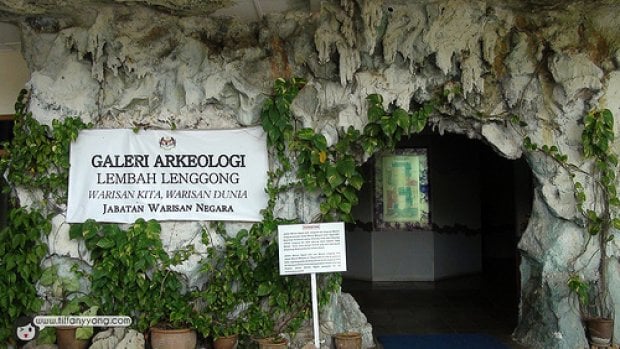
The Lenggong Archaeological Museum displays artefacts excavated from the Lenggong Valley and also houses the “Perak Man”. The Perak Man is the 11,000 years old human skeletal remain which was discovered at Gua Gunung Runtuh, a cave situated in Elephant’s Head Hill (Bukit Kepala Gajah) in 1991. The skeleton was a male in this fifties with a height of approximately 157 cm.
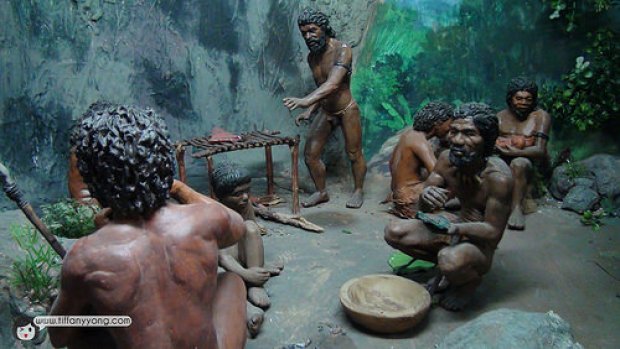
Besides the Perak Man, 100,000 year-old stone tools have been excavated at Kampung Geluk and Kampung Temelong. The Lenggong valley is one of Peninsular Malaysia’s most important areas for archaeology. It is the site of the oldest known place of human activity in the Peninsula. On 30th June 2012, the Lenggong Valley was listed by UNESCO as a World Heritage site.
Kota Tampan Archaeological Museum Opening Hours: Mon to Sat: 9AM – 5PM; Fri: 9AM – 12PM, 3PM – 5PM
Entrance Fee: Free.
Address: Department of National Heritage, Kota Tampan, Lenggong, 33400 Perak, Malaysia
Tel: +605 7679700
Photo-worthy Spot: ** | Heritage/Historical Value: ***** | Recommended!
Entrance Fee: Free.
Address: Department of National Heritage, Kota Tampan, Lenggong, 33400 Perak, Malaysia
Tel: +605 7679700
Photo-worthy Spot: ** | Heritage/Historical Value: ***** | Recommended!
5. Gopeng Heritage House Museum
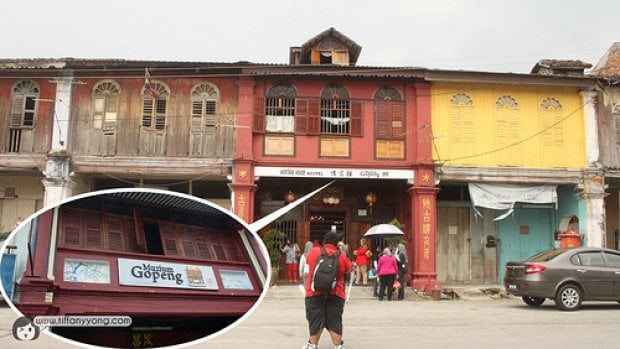
Hidden among a row of shophouses, the Gopeng Heritage House Museum can easily pass off as an antique shop. Stepping into the museum, it was as if I had time-travelled a century back.
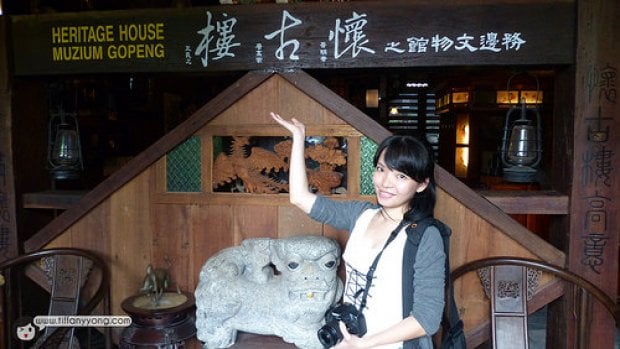
This museum was initiated by Mr. Wong Kuan Cheong and constructed with the help of the local community. Mr. Wong donated his family house to turn it into a museum. It does not charge an admissions fee and maintenance is funded by donations from the community and the public.
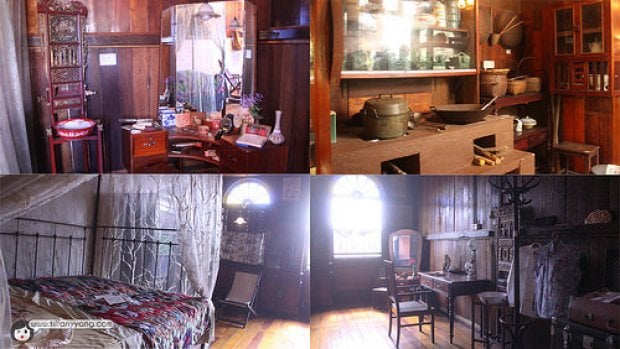
With the countless antiques, old furniture and calligraphy paintings on display, I was able to catch a glimpse of the simple lives of the Gopeng people. The second level of the shop house was decorated and filled with exquisite decorations and furnishings, reflecting how life of a middle-class family was like a century back.
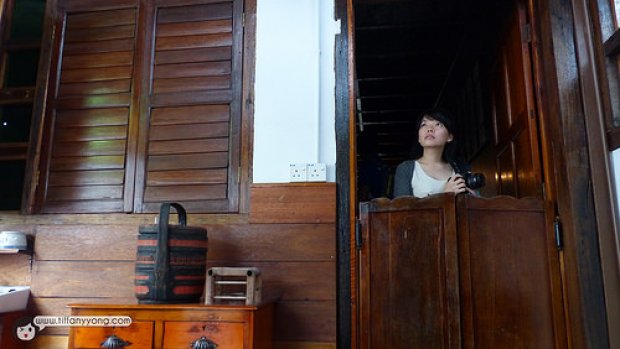
The nostalgic rooms and furniture may seem familiar if you’ve been watching period dramas. Walking into this place made me feel separated from the modern hustle and bustle of life just few metres away from the house.
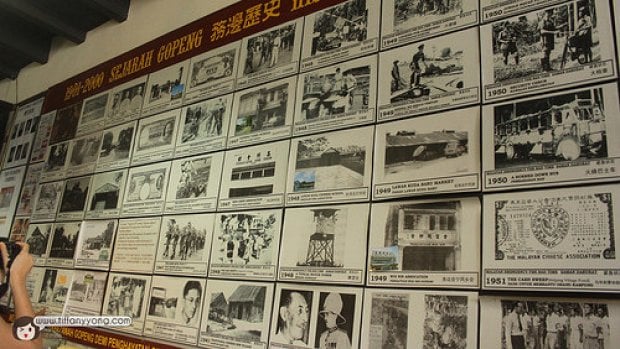
Besides that, the community also set up the Gopeng Museum to educate people on the history of tin mining. It was set up by a banker, Mr. Bernard Yaw, who wanted to fulfil his mother’s wish to rebrand the town of Gopeng and to open a Gopeng Museum.
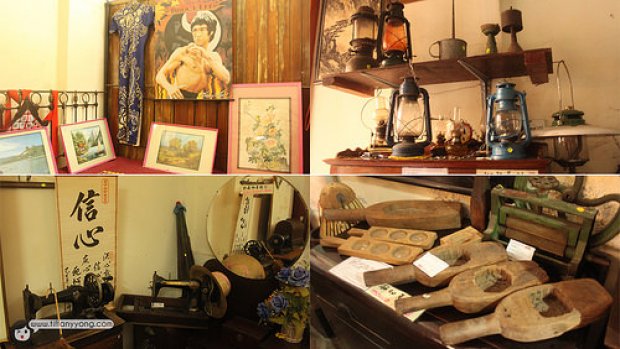
You will find the equipment the Chinese tin miners used, as well as other items used in their daily lives back in the days.
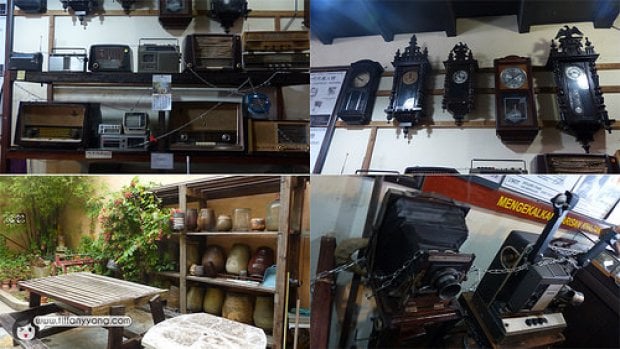
This is one place where you can’t help but keep snapping photos hoping to capture the nostalgic atmosphere and memories. However, nothing beats exploring the houses yourself.
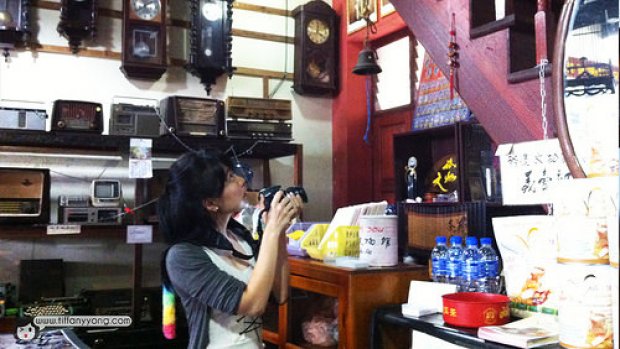
Gopeng Museum Opening Hours: 9:00am – 5:00pm (Only Open On Friday to Tuesday)
Entrance Fee: Free
Address: No. 28, Eu Kong Street,31600 Gopeng, Perak
Tell: +605-359 782
Gopeng Heritage House Opening Hours: 9.00am-3.00pm (Only On Weekends)
Entrance Fee: FREE
Address: 6, Jalan Sungai Itik, 31600 Gopeng, Perak.
Tel: 016-542 1287(Phang Sek Hong) Photo-worthy Spot: **** | Heritage/Historical Value: ***** | Recommended!
Entrance Fee: Free
Address: No. 28, Eu Kong Street,31600 Gopeng, Perak
Tell: +605-359 782
Gopeng Heritage House Opening Hours: 9.00am-3.00pm (Only On Weekends)
Entrance Fee: FREE
Address: 6, Jalan Sungai Itik, 31600 Gopeng, Perak.
Tel: 016-542 1287(Phang Sek Hong) Photo-worthy Spot: **** | Heritage/Historical Value: ***** | Recommended!
6. Kinta Tin Mining (Gravel Pump) Museum
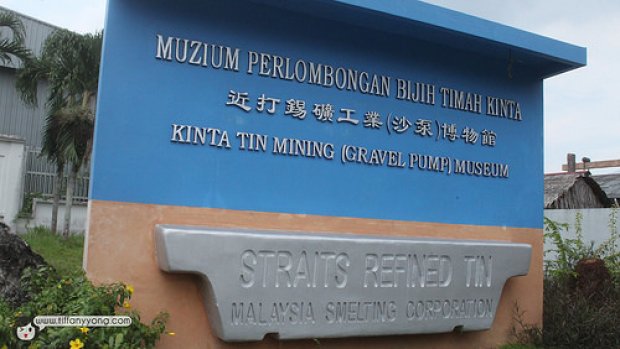
By now, the number of tin mining “museums” in the list is enough to make most people say, “Another one?” Well, at least that was how I felt initially. From the outside, this looks like another typical museum, most likely with rocks and more rocks, or plenty of machines and photos. However, it didn’t take long for me to realise that I was so wrong! From the looks of it, Kinta Tin Mining (Gravel Pump) Museum is currently Malaysia’s foremost and dedicated museum featuring the rich tin legacy in Kampar, a popular tin mining town.
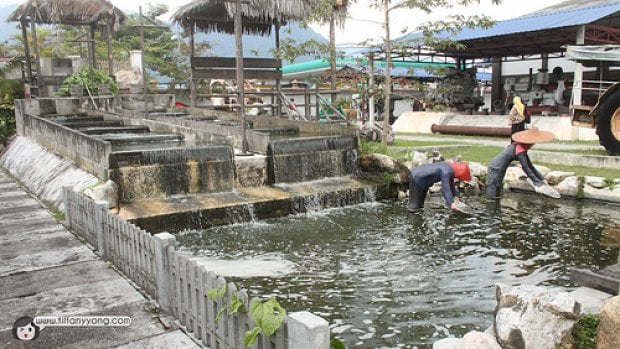
The museum was officially opened on October 2012 as a dedicated space for the gravel pump method. Mr. Tan Sri Hew See Tong, a former tin miner, used his mining site to build this museum, housing, commercial, and industrial spaces, and an education centre – all while preserving Kampar’s heritage sites!
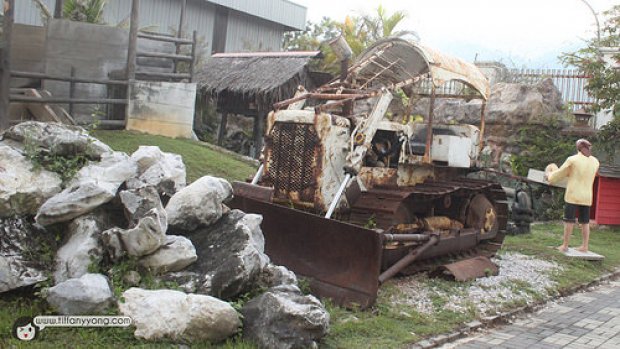
Stepping into the museum, I was fascinated by the outdoor exhibits, where there were life-size figurines showing how tin miners used the gravel pump method to mine for tin in the now defunct mines. There were numerous heavy equipment, some of them badly rusted, along the perimeter outside the main hall.
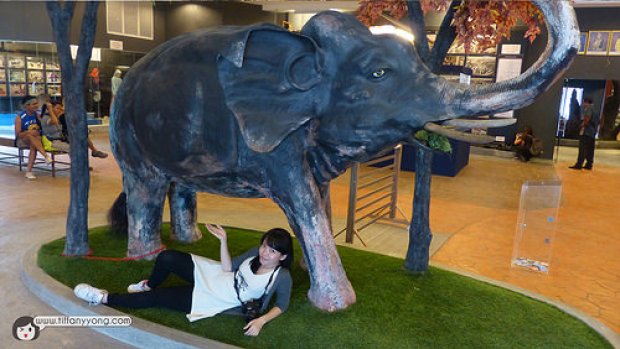
The elephant statue found near is entrance is sometimes called the ‘founder’ of the rich tin deposits of Kinta Valley. The Larut distrinct was named after this elephant! ‘Larut’ went missing one day and when it was found three days later, its leg was all covered with mud and… tin ore!
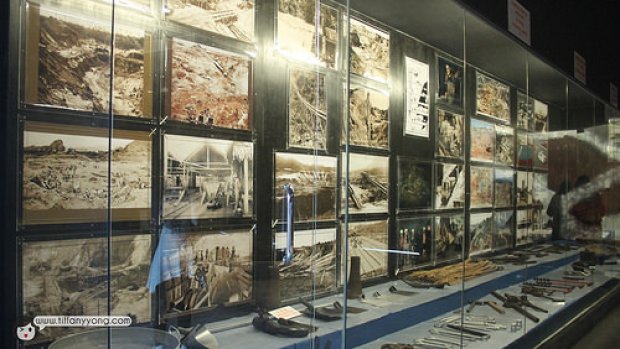
Besides the dioramas to depict the labour and tasks of the villagers when they were out in search for minerals, there is also a hallway of photo exhibits of mine holes and machinery. If you aren’t too engrossed in your selfie-taking, you might be able to hear mining crews’ shouts, construction and machinery noise in the background too.
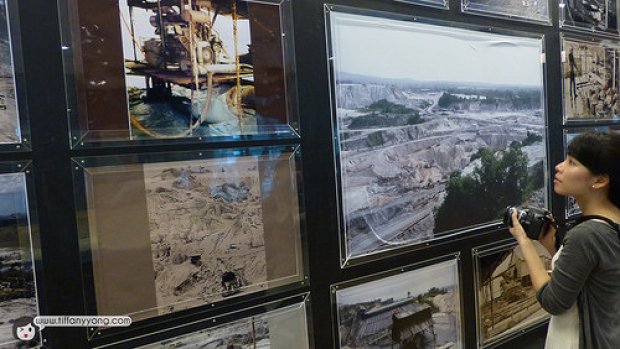
Kinta Tin Ming (Gravel Pump) Museum Opening Hours: Mon to Fri: 9AM – 1PM; Weekends and Public Holiday: 9AM – 4PM Entrance Fee: Free.
Address: Taman Bandar Baru, 31900 Kampar, Perak
Tel: +605 4662632
Photo-worthy Spot: *** | Heritage/Historical Value: **** | Recommended!
Address: Taman Bandar Baru, 31900 Kampar, Perak
Tel: +605 4662632
Photo-worthy Spot: *** | Heritage/Historical Value: **** | Recommended!
7. Kellie’s Castle
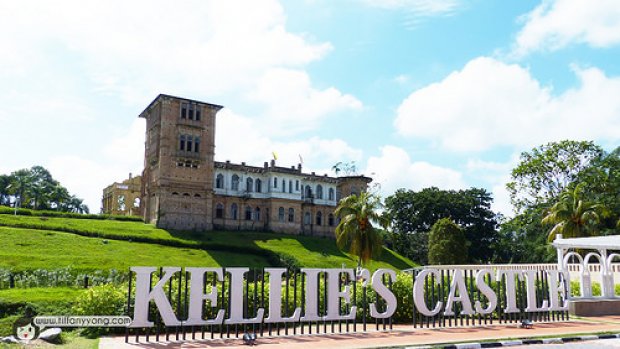
I visited Kellie’s Castle twice, and despite it being rumoured to be haunted, I still think that it is a beautiful place for wedding photo shoot. After all, the castle was built by the Scottish planter William Kellie Smith in 1915 as a sign of love for his wife. The construction of the castle was never completed and it has since been shrouded in mystery and romantic stories of love and tragedy.
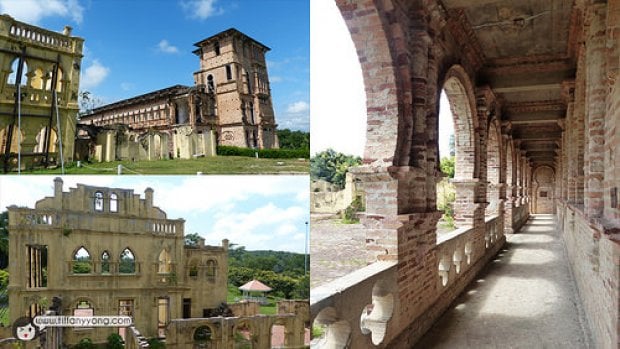
Located in Batu Gajah, the castle sits on a hill in what used to be a rubber estate. Kellie had also built a temple 1.5 km away from the castle for deity Mariamman when many of his workers contracted the Spanish Flu and died. The first elevator in Malaysia is also located in Kellie’s Castle. It travels from the roof down to the underground tunnels. However, the castle was never completed as the owner, William Kellie Smith, contracted pneumonia when he returned to England and died at age of 56 there.
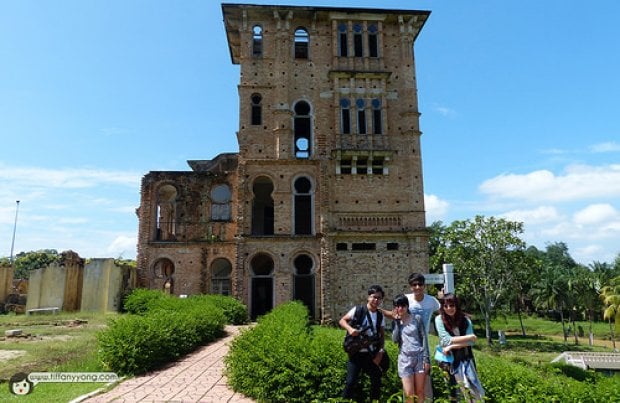
Kellie’s wife sold the castle to a British company called Harrisons and Crossfield and left Malaysia with her children. Kellie’s Castle has since been refurbished. It was even used as a setting in the 1999 film “Anna and the King”.
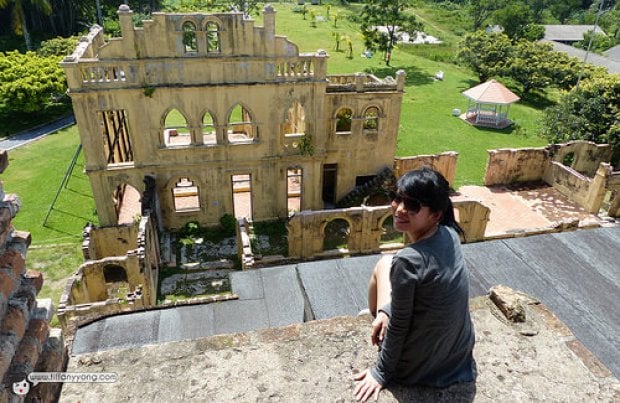
The only thing left of the first home is the covered walkway, an open courtyard and part of a crumbling wall. Today, it is a tourist attraction. To read the full story of William Kellie Smith, click here.
Opening Hours: Daily 9.00am to 6.00pm
Entrance Fee: FREE (Age six and below) | RM2 (Primary School) | RM3 (Secondary School | RM4 (Adult) | RM5 (Non-Malaysian) Address: Chalet Mdkb Kellie’s Castle, Jalan Gopeng, Batu Gajah, 31000, Batu Gajah, Perak
Tel: +605-3651336
Photo-worthy Spot: ***** | Heritage/Historical Value: **** | Highly Recommended!


Post a Comment